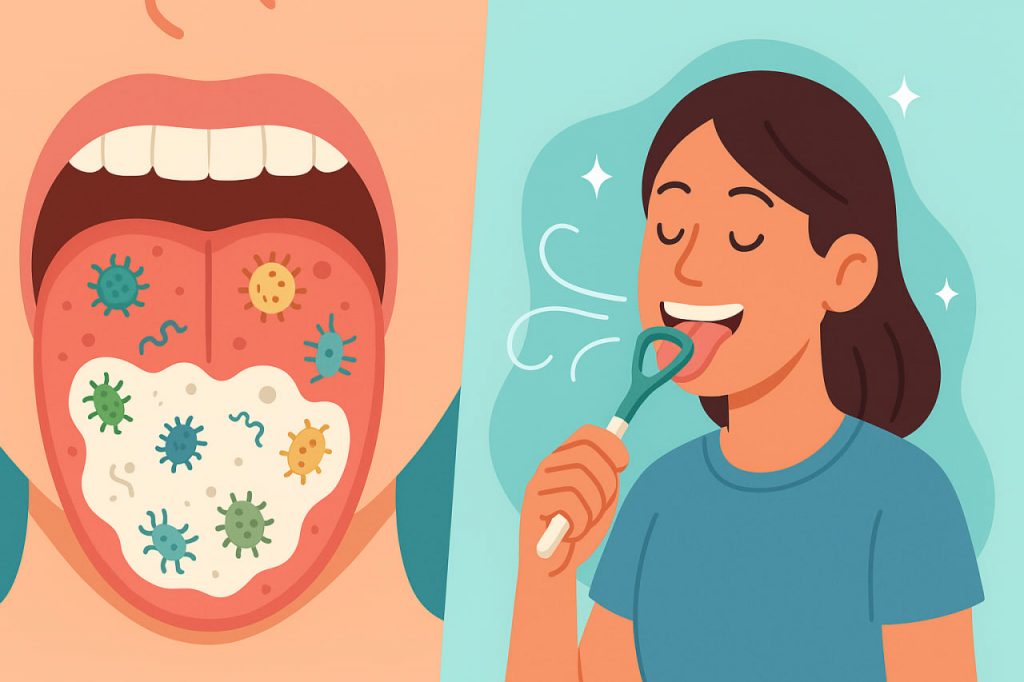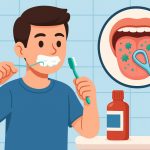While most people associate oral hygiene with brushing teeth and flossing, the tongue plays a critical role in overall mouth health. The surface of the tongue has a textured structure called papillae, which can trap bacteria, food particles, and dead cells. If not regularly cleaned, this buildup leads to halitosis (bad breath), affects taste perception, and can contribute to the development of dental and systemic health issues. Including tongue cleaning in a daily hygiene routine is a simple yet powerful preventive measure.
Microbial Accumulation on the Tongue Surface
The tongue harbors a significant portion of the mouth’s oral microbiome—the community of microorganisms living in the oral cavity. The back of the tongue is especially prone to bacterial accumulation due to limited movement and airflow. These bacteria produce volatile sulfur compounds (VSCs), which are responsible for unpleasant odors.
Over time, without regular cleaning, the microbial load on the tongue can become imbalanced, leading to dysbiosis and contributing to gingivitis or even periodontitis. A white or yellow coating on the tongue is often a visible indicator of this buildup.
Connection to Bad Breath (Halitosis)
One of the most common causes of persistent bad breath is the accumulation of anaerobic bacteria on the tongue. These bacteria metabolize proteins and release VSCs, such as hydrogen sulfide and methyl mercaptan, which have a strong, foul odor. Even people with otherwise good dental care may experience halitosis if they neglect tongue hygiene.
Regular tongue cleaning significantly reduces VSC concentrations and improves breath freshness. Clinical studies show that cleaning the tongue can reduce halitosis more effectively than tooth brushing alone.
Impact on Taste Sensation
Taste buds are located on the surface of the tongue and are sensitive to chemical stimuli. When debris and bacteria cover the tongue, they can block taste receptors, leading to dull taste perception or even distorted flavors. Cleaning the tongue removes this layer and restores sensitivity to taste stimuli.
Improved gustatory function not only enhances eating pleasure but also contributes to digestive efficiency, as taste initiates the process of salivation and enzymatic secretion.
Prevention of Systemic Health Problems
Oral health is closely linked to systemic health, particularly in relation to the cardiovascular and respiratory systems. Bacteria from the tongue can enter the bloodstream through microlesions or be aspirated into the lungs, increasing the risk of respiratory infections and endocarditis in vulnerable individuals.
Regular tongue cleaning helps maintain oral microbial balance, reducing the risk of such complications. It also supports immune defense by limiting the load of harmful bacteria entering the body through the mouth.
Best Practices for Tongue Cleaning
Tongue cleaning can be performed using a tongue scraper—a tool specifically designed for this purpose—or the back of a toothbrush. It should be done gently to avoid irritation and should reach as far back on the tongue as is comfortable. Cleaning once or twice daily, especially in the morning, is typically sufficient.
After scraping, rinsing with water or a mild antiseptic mouthwash can help remove any loosened debris. Maintaining hydration also supports natural tongue cleaning through saliva production.
Conclusion
The tongue is an often-overlooked but essential component of oral hygiene. Cleaning it regularly helps prevent bad breath, improves taste sensitivity, supports immune function, and reduces the risk of systemic infections. Including tongue cleaning in a daily routine is a simple step with measurable health benefits.
Glossary
- Papillae — small structures on the tongue’s surface that contain taste buds and trap debris.
- Halitosis — chronic or persistent bad breath.
- Oral microbiome — the collection of microorganisms living in the mouth.
- Volatile sulfur compounds (VSCs) — gases produced by bacteria that cause bad breath.
- Dysbiosis — imbalance in microbial communities, often linked to disease.
- Gustatory function — the sensory function of taste.
- Endocarditis — infection of the heart’s inner lining, sometimes caused by oral bacteria.
- Tongue scraper — a hygienic tool designed to clean the tongue’s surface.


